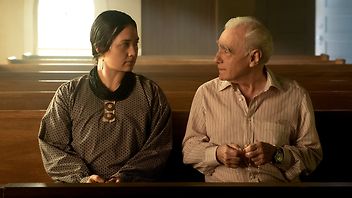Ragtag Classic Movies is a thematic strand that exclusively programs classic cinema. This strand aims to foster a dedicated cinematic space for the classics that have been heralded as important for film history and moviegoing culture.

‘The Beast’ Review: Master of Puppets the New York Times

Passport: Scenes From the French New Wave | Story by Ouma Amadou
“Quel est votre plus grande ambition dans la vie? Devenir immortel et puis, mourir.”

The Brilliant Ending to Killers of the Flower Moon | Story by Phoebe Gadsden
SPOILERS AHEAD! This story examines the ending to Killers of the Flower Moon. If you haven't seen the film yet, and don't want the ending spoiled, stop here!

‘The Holdovers’ Review: Three Sad Souls Stranded for Christmas the New York Times

Under the Skin: The Exalted Horror of Carrie by Emily Edwards
I first heard the plot of Carrie whispered at a slumber party. I was terrified of horror movies — I covered my ears at what my friend deemed “the scary part.” It took years and years for me to watch it. I had myself convinced the atrocities would live in the recesses of my brain forever. Although I’ll admit I didn’t find it that “scary” when I finally pressed play, in a way it did stay with me forever. I…

Review: In the ‘Ernest & Celestine’ Sequel, a Prodigal Cub Returns the New York Times

Videogame Sandwich Diamonds: the pleasures of Stop Making Sense at 40 | Story by Travis Bird
Stop Making Sense will be lauded in a hundred ways in the coming weeks, but the best summary I can give is to quote American composer-writer Ned Rorem, who, praising the music of the Beatles in 1968, wrote: "genius doesn't lie in not being derivative, but in making right choices instead of wrong ones."

Eye of the Beholder: Projecting Oppenheimer in 2023 | Story by Travis Bird
Ragtag is an independent cinema running 35mm film whenever possible, but it sometimes seems like we don't get to talk much about why we continue showing on film (I use film throughout to refer specifically to analog film: 70mm, 35mm, and the like.) Why do we contend with faded or worn prints, the difficulty of locating prints, increased shipping and equipment costs, and the need for specialized labor from within our projection corps?

Fantastic Mr. Fox: Adaptation at Scale | Story by Travis Bird
Before the development of Ragtag's Screentime series came about, parents regularly suggested that it should exist, and Fantastic Mr. Fox (2009) was usually the newest title suggested among a long slate of beloved classics. Even as they mentioned the film, people became more and more excited as they recalled it, amplifying their suggestion from "What about" into "You absolutely must." Wes Anderson's exuberant animated film is packed with life, including a sprawling cast of animal and human characters, careening action…

The Uncanny Arcade of Spontaneous Artifacts | Story by Travis Bird
The term experimental film still attracts annoyance, but I wonder if this is actually an expression of frustration. People annoyed by experimental may be saying that while they assume an insider knows what it means, they don’t, because it’s an inadequate descriptor. There are other words used for this kind of work, including artist film and personal film. But while experimental is inaccurate and vague, the other terms are uncomfortably specific. They point directly at one individual maker, often working…

Why ‘Barbie’ and ‘Oppenheimer’ are the perfect double feature The Washington Post

Ragtag Cinema celebrates 23rd birthday Columbia Missourian

CoMo Famous Harnesses Local Clout to Raise Funds, Build Community | Story by Arin Liberman
Ragtag isn’t the only, nor the first organization in Columbia to hold an annual local-celebrity-related fundraiser. Being in COMO Magazine’s current class of 20 under 40 myself, and married to one of this year’s stars in the Mareck Center’s Dancing with the Missouri Stars, it might even seem Columbia is saturated with this kind of thing. But I can see why. We aren’t in a huge city where one can take an endless selection of cultural offerings for granted. When…

Space is the Place: a New Afrofuturist Reality | Story by Tia Sarkar
1974’s Space is the Place is a hallmark of the Afrofuturist project and a groundbreaking piece of Black representation.

You Don’t Outgrow Totoro | Story by Tia Sarkar
As the day gets longer, the air gets warmer, and the Earth gets greener, I return to a formative place—the creek down the street from my childhood home. We were classic creek kids. In a neighborhood filled with old houses and retirees, being a kid in the Spring Ridge subdivision felt like being a member of the most exclusive club. Set loose to explore the surrounding wilderness, we’d come back home at dusk, drenched in the smell of wild grass…

Indie drama 'Return to Seoul' asks what we ever really know about ourselves Columbia Daily Tribune

Victoria Linares Villegas on A MOMENT OF INNOCENCE
Cinema can reconstruct a memory, or even better, turn it into something greater. If you allow it, chance will collide with the truth in every frame. An image can strike such moments of tenderness amidst rage and defiance: A girl, a flower, a piece of bread, the sunlight.

We Love a Little Freak | Story by Tia Sarkar
A few weeks back, my friends and I devised a thought experiment: There are only four types of movies: boy movies, girl movies, and gay movies. Michael Mann’s Heat? Boy movie. Greta Gerwig’s Lady Bird? Girl movie. My Fair Lady? Gay movie.

Notes from a Reformed Oscar-Obsessive | Story by Tia Sarkar
Growing up, my family always watched the Oscars. We’d order Chinese food, and I’d get to stay up late (even on a school night). With each passing year, I’d grow a little older and see a few more of the films nominated. We weren’t sports people so this was our Super Bowl—an event not to be missed and talked about incessantly the days after. To a child with a burgeoning interest in cinema, a metric of quality like the Academy…

The best films we saw at True/False 2023 The Pitch

Women Talking: a Guide to Traversing the Void | Analysis by Tia Sarkar
I’ve always talked a lot. I’ve routinely heard how most women do—much more than men at least. There’s a shame people project on talkative women; so much so that research suggests women speak less in public spaces because they don’t want to be perceived as talking too much.

‘Skinamarink’ Review: Night Terrors The New York Times

The Future is Now Here: Mad Max and Dystopian Exploitation | Analysis by Tia Sarkar
In 1998, director George Miller took a walk through LA. With three Mad Max films behind him, he envisioned a film that was an “almost continuous chase,” but was stuck on one essential component—the plot. Previous Mad Max entries unpacked the unstable social and political systems which inevitably led humans to ruin. Somewhere between that walk and a flight to Australia, Miller conceived of a story in which “violent marauders were fighting, not for oil or for material goods,” but…












